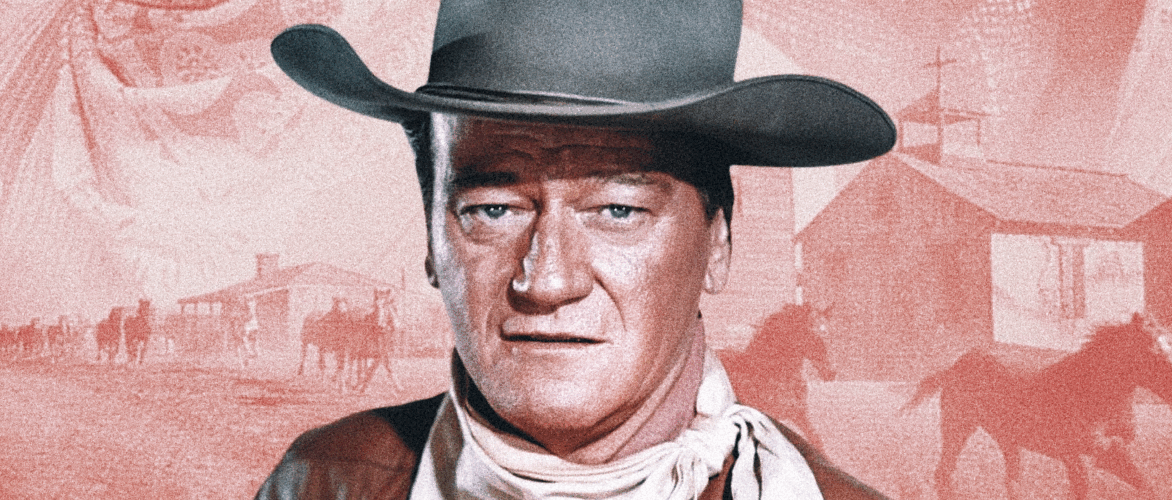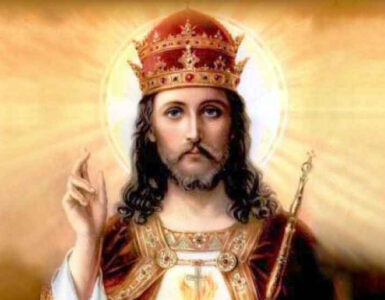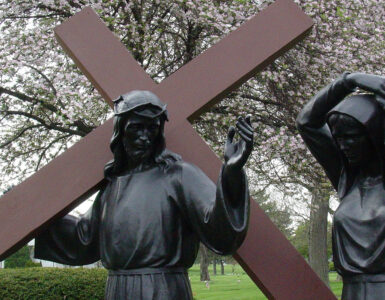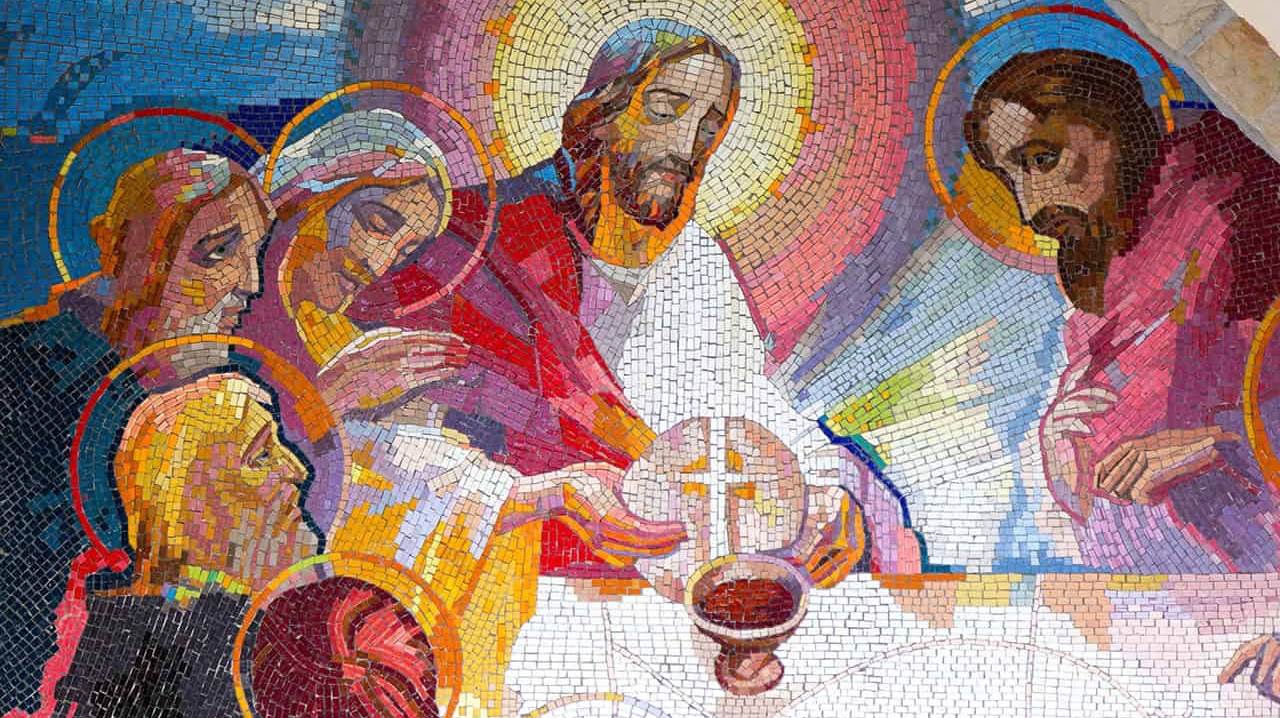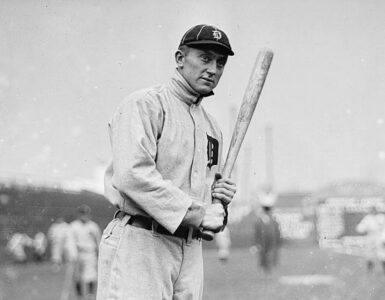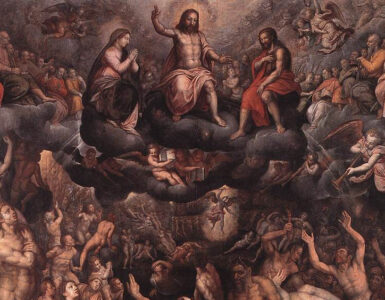As the late Christopher Hitchens wrote in his book, Mortality, we are all born to die. There is no escaping this truth. As the Bible says, we all owe God one death. It was 18th century writer Samuel Johnson, who observed that a hanging…wonderfully concentrates the mind. I think the same may also be true of death bed confessions and religious conversions.
John Wayne (*) was a cowboy movie actor and the avatar of the cinematic cowboy and gunfighter. He was also one of my favorite people. I took my title from a statement from him, I found in Catholic Vote’s The Loop. I first heard the word cardiac used to describe the play of the old St. Louis Cardinals’ football team in 1975 when eight of their first eight games were decided in the final minute of play. Of those games they went on to win seven.
Many might not know this but Wayne’s first wife was a devout Catholic and he put their children through Catholic schools. Unfortunately, no matter how much he admired his wife Josephine’s religious faith, it did not stop him from philandering on her and his two subsequent wives.
Wayne was reputed to have been an unbaptized Presbyterian, who used to tell reporters, jokingly that he was a cardiac Catholic. When The Duke was on his deathbed, dying with cancer, he put all jokes aside. At his father’s request, his son, actor Patrick Wayne summoned a priest to his father’s bedside and two days before he died, the Duke was baptized and received into the Catholic Church.
John Wayne’s death and conversion inspired me to find other well-known figures with similar experiences. During my search, I stumbled across an essay, written by Pastor Jack Wellman, called 5 Famous Deathbed Conversions. The reader may be surprised by at least a few of Wellman’s examples.
St. Dismas was lyrically known as the thief who stole Heaven, according to Bishop Fulton J. Sheen. (I referred to him in my recent essay,The Last Sermon.) St. Dismas, The Good Thief, is arguably one of the best oxymorons in the Bible. One of His Last Seven Words on the Cross was Jesus’ promise that This day thou shalt be with Me in Paradise.
It was Dismas’ penitential plea to our Lord, Jesus, remember me when you come into your kingdom, which prompted Jesus to welcome him into Paradise that very same day. It also reigns as one of the best short prayers in Luke’s Gospel.
Dismas had accepted Jesus as his savior because he recognized the injustice of His torture and punishment while admitting his own guilt and just punishment. While this conversion was not exactly a deathbed, it certainly was part of Dismas’ death.
Oscar Wilde (*) was an Irish author and playwright. I had previously known about his deathbed conversion. He was a notorious homosexual who was widely known for his quote, I can resist anything but temptation. Wilde, who suffered all the indignities of prison life for his sexual proclivities, was in ill health when he had a God-given feeling of spiritual renewal. He wrote to the Society of Jesus requesting a six-month Catholic retreat. When his request was rejected, he wept. He told journalists that he had hoped to be received into the Catholic Church. He spent his last three years on this earth, impoverished and in exile. While desperately close to despair, Wilde wandered the streets, spending what little money he had on alcohol.
In November of 1925, Wilde developed cerebral meningitis. Fortunately, Robbie Ross, a devoted friend, lover, and the executor of his will, sent for a priest. It was Father Cuthbert Dunne, an Irish priest from Dublin, who conditionally baptized Wilde into the Church, while administering the Last Rites.
John Henry Doc Holliday was a dentist, who is better known as the habitually drunk companion of lawman Wyatt Earp in Tombstone. He had also been friends with the local Catholic priest. It was a Father Edward who exposed Doc to the teachings of Jesus Christ. His cousin, Mattie Holliday, is alleged to have had been even a bigger influence in his life along these lines.
The cousins had exchanged correspondence for years. Mattie was also a Catholic nun. Her influence became even more important once Holliday became seriously ill. His conversion was included in his obituary, which appeared in the Glenwood Springs Ute Chief on November 12, 1887, stating that Holliday had been baptized into the Catholic Church.
Tatanka Iyotake, better known as Chief Sitting Bull, is one of the most famous chiefs of the Hunkpapa Sioux Indian tribe. He was both a Lakota Medicine Man and Chief. He led his people during years of resistance against the United States’ Indian policies. Sitting Bull is considered as the very last of the Sioux to have surrendered to the United States Government, which at that time had the reputation as a land-grabbing, aggressive and oppressive government, which broke treaty after treaty. This led to his revolt and subsequent killing by Indian agency police, aided by U.S. troops on December 15, 1890.
Although technically, it was not a death bed conversion, it occurred very late in his life thanks to the ministry of Bishop Martin Marty of Dakota, known for his work among the Indians, which led to his being referred to as the Apostle of the Sioux. According to the New York Times edition for April 13, 1883, Chief Sitting Bull was buried in a Catholic graveyard that same year.
King Charles II of England reigned in a Protestant nation during a time of strong religious conflict. He became king at the climax of the English Civil War, after his father, Charles I was executed in 1649. Although his sympathies were with the Catholic Church, he ruled as an Anglican. However, he tried to ameliorate the persecutions and penalties affecting non-Anglicans, including Catholics.
After King Charles dissolved the Parliament, he ruled England by himself. During his life, the king sired at least 12 illegitimate children. But as he lay dying following a stroke, he was relieved of his political duties for England and was received into the Catholic Church, dying shortly after on February 6, 1685
Buffalo Bill was better known as William Buffalo Bill Cody. He was celebrated around the world for his showmanship, especially his colorful Buffalo Bill’s Wild West shows and rodeo events. Cody had a long career, starting with his stint as a Pony Express rider at the age of 15. Wild Bill also fought in the American Civil War as a civilian scout for four years. His service as a Union scout initially won him the Congressional Medal of Honor but it was later revoked shortly after his death on January 10, 1917, on the grounds that he was not a soldier. The family fought this judgment for many years after his death. In 1989, this injustice was corrected.
Cody got his colorful nickname after the war when he contracted to the Kansas Pacific Railroad to provide buffalo meat to the railroad workers for two years. During that time, he was purported to have killed 4,282 buffalo. Later, Cody became world famous for his Buffalo Bill’s Wild West Show that toured around the world. It was extremely popular because it provided a diverse audience with a taste of the old American West.
Wild Bill’s conversion came very late in his life, as he was baptized on his deathbed in Denver, Colorado. The official record of his death says January 10, 1917. Cody was surrounded by his family and friends. He had been baptized and received into the Church the day before, with Father Christopher Walsh of the Denver Cathedral officiating. His death prompted several tributes from world leaders, such as President Woodrow Wilson, Kaiser Wilhelm of Germany and King George of England.
Wellman concludes his essay with some very good advice. He counsels that it is a very dangerous idea to wait to your deathbed to put your trust in God. Not all deaths occur in bed. The odds of one dying like John Wayne are very slim and certainly not worth betting your salvation on. Many die prematurely in auto accidents, wars, falls, murders and other household accidents where death is totally unanticipated. It is akin to playing Russian roulette with four bullets in the gun’s chambers.
Wellman rightfully believes that it is much safer to walk the straight and narrow and be prepared to die at any minute, since according to Matthew’s Gospel 24:43 Gospel, Death can come like the proverbial Thief in the Night. So, Semper Paratus, which is always be prepared is the best policy. Wayne was correct to call it cardiac because heart attacks kill more Americans than anything else on the mortality list. And it usually happens very quickly.
(*) Though Wellman discounts both Wayne and Wilde’s conversions, I trust my sources enough to include them.


